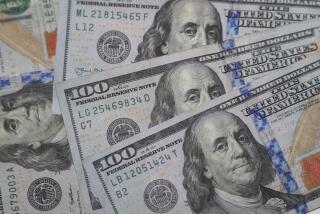FCA Posts $53-Million Net for ’85 : Rebound in Earnings Comes Mostly From Selling Assets
- Share via
Thanks to falling interest rates, Financial Corp. of America rebounded into the black last year with net income of $53.3 million that it earned largely by selling mortgage-backed securities, the Irvine-based savings and loan company said Wednesday.
The 1985 profit follows a loss of $591 million in 1984, the largest ever reported in the savings and loan industry. FCA is the parent company of American Savings & Loan Assn.
At the same time, FCA said it made a $156-million addition to its reserves for loan losses, primarily because of problem real estate development loans. The additions bring total loan-loss reserves to $575 million, the company said.
The company also announced that it has reached a tentative settlement in some shareholder lawsuits that were filed in 1984 after FCA restated its six-month earnings to show a large loss instead of a healthy profit. FCA said it expects that the settlement will cost between $32 million and $42.7 million.
FCA released its year-end results in an usually detailed statement that included both upbeat and downbeat developments. Included was the suggestion that 1985 financial results may not receive an unqualified endorsement from the company’s outside auditor.
Despite the improved results, investors reacted Wednesday by driving FCA’s stock down 50 cents a share on heavy volume of 1.64 million shares, ninth heaviest on the New York Stock Exchange. FCA’s stock closed at $11.50 a share after reaching a 12-month high of $12.125 on Monday. The stock was trading at less than $8 a share early last month.
Interest-Rate Risk
Jerome Baron, analyst for First Boston Corp. in New York, said the stock probably fell because investors were expecting too much. The earnings report was positive, Baron maintained, even though the company’s future remains uncertain because of its loan-portfolio problems and interest-rate risk.
“The profits show they are making some progress,” the analyst said. “I don’t know if they see the light at the end of the tunnel yet, but the train is still on the track.”
That reading was echoed by William J. Popejoy, who was elected chairman and chief executive of FCA 17 months ago after federal savings and loan regulators forced the resignation of his predecessor, Charles W. Knapp.
“I’m very proud of what we have done, but we still have a long way to go,” Popejoy said in a telephone interview. “There’s no reason for celebrating just because we made $53 million.”
Analyst Thomas Klingenstein, with the investment banking house of Wertheim & Co. in New York, termed the results “not disastrous but not very encouraging either. There’s not much there in the way of operating earnings.”
The year-end earnings were achieved in the final three months of the year, for which the company showed a profit of $97 million. The quarter’s red ink from the loan-loss reserves was more than offset by $16 million in operating earnings, $43.7 million in tax credits and a $287-million gain on the sale of $5 billion in mortgage-backed securities, the company said.
Popejoy said the fourth-quarter profit levels will not be maintained unless interest rates continue to drop. The drop in rates allows FCA to sell high-yielding, mortgage-backed securities at a profit.
The company also noted that:
- Its 1985 earnings may receive a qualified opinion from Peat, Marwick, Mitchell & Co. for the second year in a row. Qualified opinions are often used as a warning to shareholders that the company is subject to adverse future developments.
- The tentative lawsuit settlements will affect shareholders who bought FCA stock between April 1, 1980, and April 15, 1985. They will be compensated in either cash or newly issued FCA common stock.
- Only 25% of its deposits are now in uninsured accounts of more than $100,000, down from 55% two years ago. Those kinds of savings, often called “hot money,” proved extremely volatile when Stockton-based American Savings was hit by a $6.8-billion deposit run in the summer of 1984.
- It sold $400 million in problem assets last year, short of the original goal of $600 million. But $170 million was sold in the fourth quarter, better than had been anticipated.
- About 75% of its foreclosed property is in residential real estate located mainly in the Sun Belt. Almost 6.4% of FCA’s assets are classified as troubled, up from 3.98% a year ago.
- Assets have dropped to $27.4 billion, down 4% from the end of 1984. That means FCA may soon lose its claim as the nation’s largest savings and loan company to H. F. Ahmanson & Co., parent of Home Saving of America, whose assets now total $27.2 billion.
More to Read
Inside the business of entertainment
The Wide Shot brings you news, analysis and insights on everything from streaming wars to production — and what it all means for the future.
You may occasionally receive promotional content from the Los Angeles Times.





